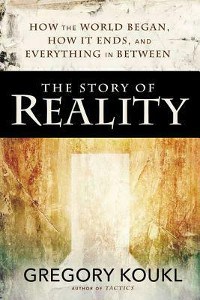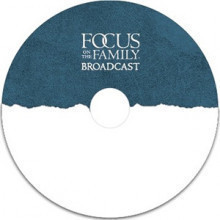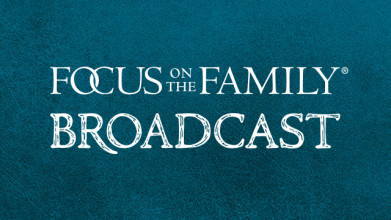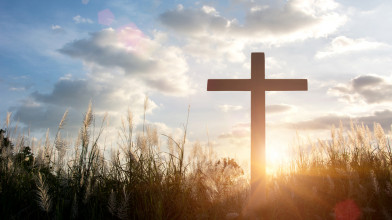Preview:
Greg Koukl: Perfect mercy is forgiveness for everything we’ve ever done wrong. And God misses nothing. That’s the good news. And those who deny God, and they deny his gift, and they decide I’m going to stand before God on my own, this is not going to be a pretty picture. And they’re gonna be banished from God’s presence forever in a place of unspeakable terror and pain. But those who receive the gift, who accept the forgiveness, are made a member of God’s family forever. And then they are able to spend the rest of eternity with God in the kind of world that our hearts have always yearned for.
End of Preview
John Fuller: That’s Greg Koukl, and he’s our guest today on Focus on the Family with Jim Daly. Thanks for joining us today, I’m John Fuller.
Jim Daly: You know, John, a phrase we often, uh, use in the Christian community is to have a Christian worldview. And, uh, that’s not to intimidate. It’s not complicated, actually. It’s, uh, just a way of looking at things the way God would look at things. What’s the lens that he sees it all through. And we’re gonna talk today with a guest who really brings clarity when we’re talking about that lens or-
John: Mm-hmm.
Jim: … that Christian world view. And I’m looking forward to the conversation.
John: Yeah. And as I said, Greg Koukl is here. Uh, he’s been with us in the studio before. In fact, uh, our conversation with him last time was the best of 2021-
Greg: (laughs)
John: … uh, episode of the program. Uh, Greg is an apologist, founder, and is the president of Stand to Reason Ministries. He’s also the host of a talk show and the author of a number of books, including one we’ll be really dialing into today. It’s called Story of Reality: How the World Began, How It Ends, and Everything Important that Happens in Between. And we have that here at the ministry. Just call 800, the letter A, and the word FAMILY, or stop by focusonthefamily.com/broadcast.
Jim: Greg, welcome back to Focus.
Greg: Uh, it is such a treat to be back with you guys again. It just seems like yesterday.
Jim: (laughs) Yeah.
Greg: You know?
Jim: It’s good.
Greg: So thank you so much.
Jim: I like the mic drop title of your book, The Story of Reality.
Greg: Yeah.
Jim: That kind of says it all right there, (laughs) right?
Greg: Yeah.
Jim: Cause we’re always in this constant battle with the world about what their story is. And they think it’s offensive to say, well, actually, we’ve got the real story.
Greg: Yeah.
Jim: And that is kind of the, the contrast between world views.
Greg: That’s right. Look at when comes to understanding the nature of reality, everybody’s got their point of view. And everybody thinks their point of view is accurate. But it turns out it’s only the Christian, it seems, for being faulted for thinking that their point of view is accurate.
Jim: Yeah.
Greg: The title to me is really important. I was having a conversation with a, uh, stockbroker once on the airplane. I fly a bit. And so I have these conversations he asked me what I did for a living. And so I told him I’m a writer, I do radio. And uh, he wanted to know what I write about and talk about. And I, I’m in a crossroads now, because I want to tell him, I write about religious topics, especially Christianity and making the case for Christianity. But I don’t want him to think about my view the way most people think about religion. And the way most people think about religion is a kind of a religious fantasy club. And that’s not my view. Uh, we’re not just following something that makes us feel better. We’re not choosing that. We’re believing the Christian worldview because we think it is the accurate view of reality. It’s true in the sense that gravity is true. We’re not talking about, uh, our Christian fantasy. We’re talking about events that really took place and people who really lived, or events that are going to take. So we’re talking about history here. Now, of course, we need to defend that. Um, and that’s what apologetics are for.
Jim: Yeah. Sure.
Greg: But the key here is communicating the kind of message that we’re trying to defend. This is true. And we mean it’s true the way gravity is true, not my truth or your truth, but true to the real world. And this is why I chose the title, The Story of Reality: How the World Began, How It Ends, and Everything Important that Happens in Between.
Jim: Yeah. That’s so good. Let’s kind of back the tape up a little bit and talk about how you became a Christian. What was the details of that? And what was your mind like? Uh, you seemed like a critical thinker. So before you encountered the Lord, were you a skeptic or what kind of person were you?
Greg: Well, I was raised in a Christian home, mo- uh, modestly Christian. I was raised in Roman Catholic home, but for us, it, it really had no depth to it. And so when everybody grew up, all the five kids, we all left. And so do my parents. Okay? And then I spent mid-sixties, a time of engaging the culture. And when you’re 18 in the mid-sixties, and you have the, the, this new culture emerging and all the things that are associated with it, you don’t want to think about God and Jesus and purity and that kind of stuff. So for about six years, I embraced the ideas of the world. And then there’s some dramatic things that happen in my life. Uh, one of them is my girlfriend of five years broke up with me. And that caused me to face the reality of my own world views, which are relativistic. I didn’t believe in objective morality. I, I didn’t believe in any ultimate meaning to life. But then I realized if that’s the case, I’m all alone own in the universe.
Jim: Mm.
Greg: And so that created (laughs) kind of an existential crisis for me. I didn’t become a Christian immediately, but what it showed me is that the ideas that I was holding that sounded so cool at the time, so popular with the culture, were not anything that was going to sustain me through the real challenges of life.
Greg: And during that time, my younger brother, Mark, had become a Christian through the Jesus Movement. And we were both on the West Coast at this time. We were raised in the Midwest but through different circumstances. We ended up in Los Angeles. And he just hammered away at, at me for months and months. And to be honest with me, got me thinking. And the Holy Spirit was working on me at that time. And, uh, to make a long story short, I just came to the realization, I don’t know how else to explain it, fellas, that Christianity was true. I know it now. It was the Holy Spirit working powerfully in my life.
Jim: Mm-hmm.
Greg: And then a September 28th, 1973, that’s when I gave my life to Christ.
Jim: Mm.
Greg: And I’ve been following him ever since. But the thing that made the big deal for me, the big difference is understanding the grace of God, which I never understood before. Oh, I understood the law. I understood all the demands that were on me, but in the system, I was raised in before, this was when in you, you gotta work your way through those laws and do as best you can and then hope that you’re going to heaven.
Jim: That is the good news. That’s, what’s so exciting about the Christian faith.
Greg: Absolutely.
Jim: And that’s what makes it a joy to share with other people.
Greg: Yeah.
Jim: You know, when you talk about that, all other religions are man trying to reach up to God.
Greg: Right.
Jim: Christianity’s the only one where he’s reaching down to us.
Greg: That’s right. And see, that was news to me.
Jim: Right.
Greg: And that was really the good news. Because I was just sharing with someone the other day who was in a similar circumstance. And I said, do you know whether you’re going to heaven or not? And he said, no, maybe, maybe not. I said, is that good news? He said, no, that’s not good news. I said, but the gospel is good news. So you believe is not the gospel.
John: Hmm.
Jim: Well, let’s get into that because I think in the book you just raised some outstanding, uh, concepts here. And let’s, you know, take a look at the pieces of the puzzle-
Greg: Sure.
Jim: … as you describe in the book. Uh, first about God and who is God as a first starting point.
Greg: Sure.
Jim: Is God real? Is God there?
Greg: Yeah.
Jim: If yes, then what?
Greg: Yes. Well, I break down the story of reality into five components just to make it easy to follow and easy for Christians to communicate with others. And this is the backbone of the story, and it is the, basically the outline as well. Okay. And those five words are God, man, Jesus, cross, resurrection. And here I mean the final resurrection to reward and judgment. Notice that you have all the components of a good story. You have all the components of a worldview, creation, fall, redemption, and restoration. But, um, but you also have our story, writ large, so to speak. So our story starts with God. Then he creates man to be in friendship with him. And human beings get themselves in a heap of trouble. And so God initiates a rescue plan. And this is key about the Christian worldview.
John: Yes.
Greg: This is the only worldview in which man does not rescue himself, because he cannot. This is the world view.
Jim: Which is exactly how God would do it.
Greg: Exactly.
Jim: That’s so funny.
Greg: So God sets up a rescue plan and becomes a human being himself to be able to rescue us. And he does that by the way he lives his life. So now we got God, man, Jesus. And the way he dies on a cross, that’s the fourth point. And what we do about what He did for us determines what happens to everyone in the final resurrection.
Jim: Mm-hmm.
Greg: So we have how the world began, how it ends. and everything important that happens in between.
Jim: Well, we’re gonna hit the-
Greg: Yes.
Jim: The concept of God again.
Greg: The God is the beginning. And the reason that God is the beginning is because he’s the first person, the first character, so to speak in the story. And the reason is, is because the story is about God. It is not about us. We come second. And this is where I turn a, a, a certain Christian slogan on his head a little bit. I’m meaning no disrespect here. I really don’t think it’s about so much about God’s wonderful plan for our lives as it is about our lives for God’s wonderful plan.
Jim: Mm-hmm.
Greg: So we’re expendable in this program. That comes second.
Jim: That’s really well said.
Greg: Yeah.
Jim: That’s, that’s critical for people to slow down and hear that. They can’t say it.
John: The culture doesn’t go there either.
Greg: Yeah. So it’s more about our lives or God’s wonderful plan. And so this emphasizes what the Bible emphasizes, that God is first. So when we start the story out, and this is explanation, gentlemen, not just for the Christian to get it straight, because for a lot of Christians, their, their story, their picture of reality is like a puzzle that’s in a pile of pieces. They’d never put it together before. And this is what the story of reality is meant to do, put it together in a sequential form so we can see the big picture. And the first part of that story is God. He’s the center. He’s the most important player. The story is about Him, not us.
Jim: Yeah. And you’ve addressed, I think the second we is man, and his, or her place in that relationship.
Greg: That’s right.
Jim: Let me ask you a question that’s so common, uh, about evil. If God is so good, why does evil exist in this world?
John: Mm-hmm.
Greg: Yeah. Well, that comes up all the time.
Jim: All the time.
Greg: It’s a classic question regarding Christianity and Christian theism. And, um, on a broad sense, I’ll say this about the book. Um, if you do not understand the story of reality, how it all fits together in an elegant way, then you are, gonna have a hard time with this question. But it turns out that the problem of evil is not the problem for the Christian that people think it is. And the reason is, our story is entirely above the problem of evil. It starts in chapter three. It doesn’t get solved until 66 books later. Right?
Jim: Right. (laughs)
Greg: I mean, if there was no problem of evil, there’d be no story.
John: Mm.
Greg: Our story is all about how God deals with evil in the world. All right? And the important thing about evil is that first of all, it’s part of our story. And secondly, our story is not over yet.
Jim: Mm-hmm.
Greg: And we find ourselves right now, fellas, in the middle of the story. And so we see all of these awful things happening. Why does this happen? It’s because of something that happens in the beginning of the story. The world wasn’t always like this, God made the world just exactly the way his noble mind intended.
Jim: Mm-hmm.
Greg: It was all good. And that means it was all operating just the way he wanted it to operate. But what happened? There’s another figure in this. And that figure is a very dark figure who tells our first parents a terrible lie. He says that the king cannot be trusted. He says that he’s holding out on you. Do your own thing, make your own rules, follow your own way, and freedom awaits you.
Jim: Mm-hmm.
Greg: And so they consider the temptation. They give it to lie. And they disobey. And in disobeying, they betray the friendship that God has made them for. And everything changes. The world gets broken. Their broken relationship with God, their broken relationship with each other, their broken relationship with the environment. In fact, what human beings do there in violating the command of God breaks the entire world. And this is why there’s a problem of evil. And it happens because God has given something valuable called moral freedom.
Jim: Mm-hmm.
Greg: He, we are made in the image of God. We have a moral character. And because we’re made in the image of God, we are able to have friendship with God. We’re not like the other creatures. But that also has a liability to it. And that is we could do good, but we could also do wrong. And man did not use the liberty that he was given well. And this plunged the world into darkness. Now what?
John: Hmm.
Greg: Everybody knows, by the way, that the worlds and darkness. And this is something you can count on. It doesn’t matter who you talk to or when, when they lived, or where they lived. Everybody knows that something is wrong with the world. Okay.
Jim: Mm-hmm.
Greg: And we have a way of explaining why the world is that way. But not just why, how to solve it.
Jim: Mm-hmm.
Greg: And that’s one of the most powerful elements of the Christian story of reality.
John: Such good stuff today on Focus on the Family with Jim Daly. Our guest is Greg Koukl. And, uh, we’re covering a lot of deep truths. If you’d like to go further, get a copy of his book, Story of Reality: How the World Began, How It Ends, and Everything Important that Happens in Between. And of course, we have copies of that here at the ministry. Call 800, the letter A, and the word FAMILY. Or stop by focusonthefamily.com/broadcast.
Jim: That’s so good, Greg. And man, it’s really succinct the way you’re laying this out. So God, man, now Jesus.
Greg: Right.
Jim: The third part of this, uh, story. Uh, what is Jesus’ role? What did he come to do?
Greg: So here’s the situation. Man’s in a terrible circumstance. He has broken off from God. He has no hope in himself. He has lost. I mean, he’s in trouble. He needs to be rescued. He can’t rescue himself. He’s unplugged from the only source of life that’s available for himself.
Jim: Mm-hmm.
Greg: And he can’t plug himself in. So now what? God initiates a rescue plan. And it’s the most remarkable idea imaginable. God decides to become a man in the person of Jesus. And so we have a question now, who is Jesus? Who was He? Well, He was a human being. I mean, He had all human qualities. He had a-all human emotions. He went through the kinds of things that you and I went through. He was one of us. And therefore he can identify with us as a human. We can identify with him as a human. He knows what it’s like to be in our shoes-
Jim: Mm-hmm.
Greg: … as we walk the, a difficult life day by day. But he was more than that. It’s interesting when you look at the beginning of Jesus’ story. His story starts, “In the beginning was the word. And the word was with God. And the word was God.” In other words, the beginning of Jesus’ story is the same beginning as the story itself. That is, this person that’s called the word is the very same one that was there at the beginning making everything. And then later it says, he became flesh, he dwelt among us. And we be held as glory as of the only begotten of the Father, full of grace and truth. In other words, God stepped down. And I want you to think about, if you have children or grandchildren and they’re scared, they’re crying, they’re in trouble, they’re frightened, how would you comfort them? How would you meet their need if they were injured or they skinned their knee, wouldn’t you bowed, bow down a little bit? Wouldn’t you get loved?
Jim: You’ll get down eye to eye.
Greg: You’ll get eye to eye. And this is exactly what God did.
John: Mm-hmm.
Greg: He came down, he got low, he got small by becoming a human being so he could be there with us. Emmanuel, God with us, is such an important thing.
Jim: Yeah. And let me just add Greg. I mean, you are really hitting it out of the park. I mean, you’re right there. There’s so much depth to what you’re saying. You’re, we’re not gonna be able to cover it today.
Greg: No.
Jim: And that’s one great reason to get the book, but there’s so much in there about covenant relationship and-
Greg: Right.
Jim: … you know, the blood sacrifices that we’re given.
Greg: Right.
Jim: Which is part of the Jewish culture and tradition and part of God’s relationship to the Jewish people.
Greg: Right.
Jim: These are things you have to continually dig into to better understand. And what you’ll find is it gets more and more awesome.
Greg: Right.
Jim: I mean, it, it, it, the way it fits together, the things that you’re saying at this level right now, the more you dig into it, the more you realize, wow, God really did have a plan.
Greg: It is a mind blower when you think about that.
Jim: It is. It is. And I, you know, we’ve gotta keep it moving here.
Greg: (laughs)
Jim: But I, you could just sit and talk for hours-
John: Mm-hmm.
Jim: … about these concepts and these realities, your book, The Reality, you know?
Greg: I think this what, is a strength of the book in that it’s a primer of sorts. It touches on the key points of theology that are central to the Christian worldview, but it does it in a way that’s accessible, not only to the Christian, to the younger Christian, to the older Christian who doesn’t have it all together, hasn’t put all the pieces of the puzzle together in one picture. But I, I wrote this book constantly for the non-Christian who’s reading it. It’s not thick with Christian lingo. It is very easygoing. It is a, it’s a narrative kind of feel.
Jim: Yeah.
Greg: And no one will ever be embarrassed to give this book to their non-Christian friend.
Jim: Right. Which is great. And again, it’s much like an onion. You just keep peeling spiritual truth-
Greg: Mm-hmm.
Jim: And it just keeps going in. Right?
Greg: Mm-hmm.
Jim: It’s wonderful.
Greg: Mm-hmm.
Jim: Le- we’ve talked about God, man, the rescue plan in the form of Jesus, God coming to be with us and being the sacrifice for us.
Greg: Sure.
Jim: Let’s move to the cross.
Greg: Okay. Now this is the next step. I ask the question, who was Jesus? Now, what did he come to do? And first thing he did is he came to live the life that we never lived. He lived the perfect life for us. Okay? And then he took on that cross, all of our bad stuff so that we can get his good stuff. There’s an exchange that took place there. Okay? And this is sometimes hard for people to understand. So I was explaining to a young lady on an airplane (laughs) from Jacksonville to Miami. She was Muslim. She was a sweetheart. We got into this conversation about God. And I was just trying to simply show the difference between her God and our God. And I said, if somebody had, uh, was a terrorist who came on this plane and was gonna drag her off the plane. And of course, when I say this word, I’m whispering now, you know, on the airplane. But I put my arm in front of you and I said, don’t take her, take me instead. What would you think about that? And she said, I can’t imagine anyone ever doing that for me. And I said, that is what God has done for you. Yahweh not Allah. Jesus not Mohammad. God came him down in the person of Jesus and he said to the Father, take me instead. That’s the trade. And that trade took place on an outcropping of rock that the locals called Golgotha the place of the skull. But we know it as Calvary, the place of the cross.
John: Mm-hmm.
Greg: And that is where Jesus took the trade. We got his righteousness, and he got our sin. Every sin that every person had ever committed, the weight of that was poured out upon Jesus. And the wrath of God in those three hours when, when darkness shrouded the cross so that, at the end, Jesus could say, it is finished. In other words, it’s accomplished. I paid for it all. We are now in a position to release ourselves of all of that guilt, the kind of guilt that I was concerned about as a-
Jim: Mm-hmm.
Greg: As a non-Christian. And then I realized there was grace for me as a Christian. We release that to Jesus, and we receive the goodness that he has earned in his own life. That’s the trade. He gets our badness. We get his goodness.
Jim: Yeah.
Greg: It’s called justification. It’s called substitutionary atonement. But I like the word gospel. Good news.
Jim: Yeah. Greg, this is so good. And um, I mean, what a, a basic good concept to cover. And, uh, I’m just, you know, I’m bubbling here with things-
Greg: (laughs)
Jim: … to talk about. We’re gonna wind down here, unfortunately, with the time, but-
Greg: Mm-hmm.
Jim: Okay. So we’ve hit God, man, Jesus-
Greg: Cross.
Jim: … crucifixion, the cross-
Greg: Cross. That’s right.
Jim: … the need for that.
Greg: Right.
Jim: Now we’re going to the resurrection.
Greg: Yeah. Now what Jesus did on the cross is available to us. All we have to do is take it as a gift, put our trust in him. And that’s what the story calls faith. Not a leap of faith, but a step of trust. And I have soft apologetics all through the book to tell why we should believe these things are actually true. But this takes us to the last step. The final step of the story, God, man, Jesus, cross, resurrection, final resurrection. At the end of time, one of two things is going to take place. Everybody’s gonna be raised with the dead, that’s for sure. But one of two things is going to happen, either perfect justice or perfect mercy. Perfect justice is punishment for every everything we’ve ever done wrong.
Jim: No atonement.
Greg: No atonement.
Jim: Right.
Greg: And God misses nothing by the way. He’s making a list and he is checking it twice. But perfect mercy is for forgiveness for everything we’ve ever done wrong. And God misses nothing. That’s the good news. And those who deny God, and they his gift, and they decide, I’m gonna stand before God on my own. This is not going to be a pretty picture. And they are gonna be banished from God’s presence forever in a place of unspeakable terror and pain. But those who receive the gift, who accept the forgiveness, are made a member of God’s family forever. And then are able to spend the rest of eternity with God in the kind of world that our hearts have always yearned for.
John: Mm-hmm.
Greg: C.S. Lewis again, the door that we’ve been pushing on all of our lives will finally open.
Jim: Yeah.
Greg: And that’s the best news
Jim: It is. And Greg, I, I, I think, I just want to convey for that person that is struggling right at that point, that hasn’t really understood this, that, you know, that issue of human pride and flesh and-
Greg: That’s right.
Jim: … you know, I would never ask God to do that for me, if God is real. I mean, I should take care of that stuff myself.
Greg: Mm-hmm.
Jim: Right? That… And that is a form of pride.
Greg: Yeah.
Jim: And I think the, the hearing you express it the you did, which is correct, and true, and right. Some people are going, well, wait a minute. I don’t know why that would be necessary, um, why, why would God have to die for me? I mean, pull that together a little tighter.
Greg: All right. Everybody knows-
Jim: Because it, it feels like guilt.
Greg: Yes, of course. Well, everybody knows… I mentioned earlier that there’s something wrong with the world. But there’s something else that everybody knows that the problem with the world is them. That everybody realizes there’s something inside that’s broken. Okay? And that thing that’s broken is badness. And they hold it from other people, but they can’t get away from the guilt themselves. So we have this need. And God loves us enough to satisfy what’s required so that he can forgive us of that guilt.
Jim: Mm-hmm.
Greg: Paul said he was the greatest of sinners, but God forgave him, which means he can forgive anybody else. And, and gentlemen, if there’s anyone thinking, right now, God can’t rescue me, I promise you, what Jesus did on the cross on your behalf is fully adequate to forgive even the sins that you have if you turn to him and ask him to do so. That’s the good news. And that will save you so that, at the end, you will know that you will be with him forever just the way he intended in a wonderful friendship with him.
Jim: Yeah.
John: Mm-hmm.
Jim: You know, Greg, this has been probably one of the best half hours in terms of spiritual truth that we’ve done at Focus.
Greg: Oh, thank you.
Jim: And we always talk here, and Dr. Dobson even would say this so often, that, you know, we can help a family, uh, improve their marriage, improve their parenting, but if we haven’t pointed people to the author of the family, we kind of failed.
Greg: Right.
Jim: And I certainly have, uh, continued that tradition of recognizing that truth, that salvation and embracing the gift.
Greg: That’s right.
Jim: Meaning Jesus, that he is the Son of God.
Greg: Mm-hmm.
Jim: That’s what Greg means by that, that you say yes, Yes-
Greg: Mm-hmm.
Jim: … and you confess with your lips and believe in your heart that Jesus is the son of God, is God.
Greg: Mm-hmm.
Jim: Um, that’s the distinction.
Greg: And this is why, by the way, Jesus is the only way of salvation.
Jim: Correct.
Greg: He’s the only one who solved the problem. And so when you see the big picture, the story of reality, you realize how God solves the problem of evil in a singular solution to the person of Jesus, which is why he’s the only way.
Jim: Yeah. So, listen, if we haven’t captured your imagination here, then, uh, you know, (laughs) we’re gonna keep praying for you and ask the Lord to keep opening up your eyes. But if you know somebody, or if it’s you that really needs to read this great book, The Story of Reality, which again, Greg, I love the title. It just kinda lays it out there. Um, forget the news. (laughs) This is the real news, the good news.
Greg: Mm-hmm.
Jim: And, uh, we wanna get it into your hands. If you can support, Focus on the Family, uh, monthly would be great, but if you can make a one-time gift, that’s great too. And we’ll send you a copy of Greg’s book, The Story of Reality, as our way of saying thank you. And all those proceeds go right back into all this effort, introducing people to Christ, uh, helping a marriage, uh, survive, and to thrive-
Greg: Mm-hmm.
Jim: And helping parents do the job they need to do. In addition to saving pre-born babies. I mean, we’re almost near a half a million babies saved through that program.
Greg: Mm-hmm.
Jim: We are about life because God has created each one of us unique and, uh, in His image, as you said, Greg.
Greg: Sure.
Jim: So we’re going at it every day on every cylinder that we can. And Greg, you really have set the foundation for what we do.
Greg: Thank you so much.
Jim: So thank you.
Greg: It’s a pleasure to be with you guys again. Thank you.
John: Go ahead and, uh, follow up on what Jim was offering. Uh, contact us to get a copy of this book, to learn more about Jesus Christ and eternal life. Uh, we’re here. Our number 800, letter A, and the word FAMILY. And online, uh, we have all sorts of great resources. The starting point is a phone call, 800, the letter A, and the word FAMILY. Or stop by focusonthefamily.com/broadcast. Well, on behalf of Jim Daly and the entire team, thanks for joining us today. Plan to be with us next time. We’ll have hope for those who are trying to survive divorce and single parenthood. And we’ll once again help you and your family thrive in Christ.



























